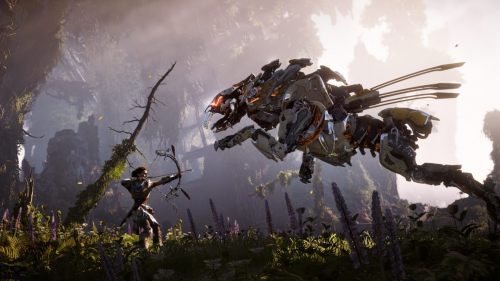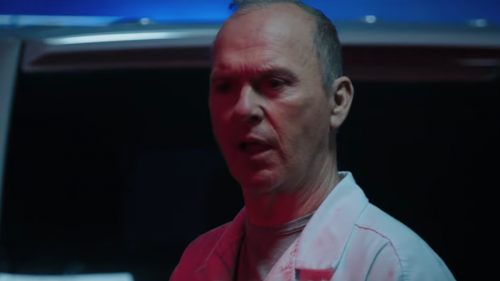Players, Polygons, And Politics: Takeaways From E3 2018
This past week was, as it always is, the most important of the year for the video games industry. It saw its biggest trade show, the E3 Expo, unfold in Los Angeles, with console manufacturers, publishers, and developers hawking their products to each other and the public. Since its birth as a purely industry and investor-focused conference, E3 has become a massive publicity opportunity for every company involved. It’s where major games get announced, where new hardware is unveiled, and where the industry’s biggest and most embarrassing marketing stunts get pulled.
E3 2018 was like many E3s: full of glitzy presentations, breathless hands-on demos, and splashy surprise releases. But it also sparked a number of conversations and debates about issues that affect both players and developers.
THE FUTURE TOGETHER
Bethesda's Fallout 76 made one of the week's biggest splashes - the publisher had cannily teased it days beforehand, ensuring that their stream would be hugely popular. But what Bethesda Game Studios showed off was altogether unlike Fallout games of the past. It's an online multiplayer game - the first the studio has ever made on this scale - and that's caused consternation amongst fans.
Fallout has always been a quest-based RPG - and like Bethesda's Elder Scrolls series, one that's played alone. Fallout 76, on the other hand, shifts the emphasis to survival, taking place in a sprawling wasteland - populated by dozens of other players. Friends or strangers can team up, or take each other on, as they rebuild a post-apocalyptic West Virginia.
Curiously, this is a similar predicament shared by BioWare, which showed its upcoming game Anthem at EA's press event. Anthem will retain some elements of BioWare's acclaimed storytelling, but jettison others in favour of an online multiplayer persistent world akin to Destiny. Both studios are copping flak from fans of their single-player classics, who claim they're selling out to industry trends - specifically, that of the “live game” model, which sees content continuously updated in an effort to keep players engaged.
This trend isn’t going away anytime soon. E3 was filled with games that have been around for months or years - Fortnite, PlayerUnknown’s Battlegrounds, For Honor, Rainbow Six Siege, Destiny 2 - that continue to hook and maintain players with live content. The game-as-service model works well for developers - offseting the huge cost of development by lasting longer, being resold less, and netting a constant trickle of in-game purchases - and given the player bases those games boast, it clearly works for the players too. BioWare’s Casey Hudson says he wants Anthem to be “the HBO series of games,” and that’s a tantalising proposition - as long as you dig the series to start with.
It remains to be seen, of course, how well Fallout 76 and Anthem juggle their respective studios’ historical strengths with online gameplay. I, for one, look forward to exploring and rebuilding Fallout 76's beautiful creature-strewn world with friends; I've also seen people vowing to play as NPCs within the game, offering quests and the like, which is potentially super-cool. I'll also give Anthem a shot, although BioWare has yet to truly sell me on it. I’ve warmed a lot to multiplayer-centric experiences recently, largely thanks to Destiny, and I’m even into Hitman 2 and Wolfenstein Youngblood going co-op. It’s all down to how the developers support varying modes of play - and how they plan to keep players invested, both emotionally and financially.
ETHICS IN VIDEO GAME ASSET CROWDSOURCING
Ubisoft’s E3 presentation saw a significant update on Beyond Good and Evil 2, a game whose promises reach almost No Man’s Sky levels. A technical marvel at least, BGE2 looks to be reaching for the stars to the point that it may even land on the next generation of hardware. So ambitious is it that Ubisoft has teamed up with Joseph Gordon-Levitt’s HitRECord crowdsourcing company to solicit art and music from the game’s community - a surprisingly devoted community for a game that’s probably still over a year away from release. This is where things get complicated.
HitRECord, it’s worth noting, is unlike many crowdsourcing initiatives, in that it pays people for their contributions. That’s good! But it wasn’t mentioned in Ubisoft’s presentation, giving rise to fears the company would be Hoovering up artwork without compensating its creators. At the very least, Ubisoft committed a PR faux pas. But despite offering compensation, the BGE2 crowdsourcing kerfuffle is representative of a larger issue in creative industries - one that Ubisoft is not alone in exploiting.
Central to the issue is the fact that Ubisoft and HitRECord will only be paying creators for work that gets used in the game. This may sound reasonable to the unengaged, but for people who rely on creative work as a source of income, it’s pure uncertainty. Spec work - spending time and effort on something that may not get bought - is a bane of the creative world. HitRECord defends the BGE2 scenario as “community collaboration,” but that sounds like a euphemism for crowdsourced labour when you consider the economics behind it.
Paying creators on a per-piece basis generates massive company savings. Beyond Good and Evil 2’s current budget for crowdsourced assets is $50,000 - about the cost of employing a single person for a year. Not only is Ubisoft not paying for unused work this way; they’re not paying any overheads that they would for a traditional employee. Employees get salaries, benefits, and at least temporary job security; one-off contractors get none of that. Freelancers are constantly at the mercy of what gigs are available, and companies’ increasing exploitation of the gig economy ensures that full-time and even part-time positions are less and less common. It’s a situation that creates debilitating anxiety in creatives, not to mention a lack of steady income - but to employers, it's a simple cost-saving measure that can conveniently be spun to look like community engagement. In an industry already known for exploiting labour through practices like crunch and an aversion to unionisation, it’s a bad look.
Ubisoft didn’t create this situation, but it’s sure going to benefit from it.
TAKING A STAND AGAINST TAKING A STAND
Ubisoft also faltered by again refusing to engage with the politics in its Tom Clancy's The Division series. Though the online co-op shooter’s sequel, demoed in depth at E3, seems vastly improved from a mechanical point of view, The Division 2 does not appear to address the issues that many critics, including myself, took with its predecessor. The first game cast the player as a government agent killing hoodie-wearing looters, among others, in a military-led crackdown - and did so without any critical or self-awareness. Its incidental writing and overall gameplay clashed frequently, creating an unsettling, thematically confused game. Now, The Division 2 moves the action from New York to Washington DC. Clearly, there's politics to be found there, right?
Wrong - allegedly. Creative director Terry Spier doubled down by stating point-blank that The Division 2 is “definitely not making any political statements.” That’s an unacceptable explanation for a game based on the work of a notoriously outspoken political conservative, where you play as a government agent shooting dissidents, that’s set in fucking Washington DC. It’s designed not to offend any potential players, regardless of their political alignment, but such non-messaging will only truly satisfy players for whom violence and authoritarianism is desirable. Refusing to take a stand is, in itself, taking a stand - in support of the status quo.
This is a common issue in Ubisoft games. Far Cry 5 wasted a potentially brilliant scenario by turning its American militant religious cult into a generic bunch of madmen. Watch Dogs was similarly confused as to what - if anything - it was trying to say. But this is all not to rag on Ubisoft specifically. The company showed several terrific-looking titles at E3, and it’s certainly not the only developer to put across confusing thematic messages.
Bethesda, for example, reversed the Fallout's tragic approach to nuclear weaponry, turning nukes into a fun game mechanic with Fallout 76's launchable missiles. Shadow of the Tomb Raider at least engages with the idea that its protagonist's culture-raiding and murder sprees are colonialistic and repulsive, but still uses those elements as a primary source of fun for the player. Sony’s Last of Us 2 demo saw one of the medium's most genuine, tender-feeling moments - a dance and kiss between protagonist Ellie and her girlfriend, of which developer Naughty Dog definitely understands the implicit politics - but that’s ultimately just a cutscene in a game that’s mechanically still about eviscerating enemies. At what point do AAA publishers just admit that they’re telling stories about ugly violence - even subversive or self-aware ones - because that’s the only way anyone can conceive of their characters interacting with the world in the current market?
Publishers have to face up to the fact that all art is inherently political. You can’t create art outside the context of the world in which it's made. People are going to respond to the thematic messaging in your games, whether it’s intentional or not - and to claim that your games are apolitical (especially something like The Division) is naive at best and outright ignorant at worst. If developers want their games to be considered art, they need to accept the baggage and responsibility that comes with creating it.
THE CONSOLE WAR NEVER CHANGES
E3 is always framed as a contest between the three major console manufacturers, and increasingly between major publishers as well. This year’s E3 saw striking differences in how the three platform-holders exerted their influence and staked their territory - and it's not all good for the players.
Microsoft got in early with whispers of the future. Xbox head Phil Spencer confirmed that the Xbox One’s successor is currently in development, shifting the focus away from the One’s current spot in second place. Indeed, several games Microsoft showed - Halo Infinite, Metro Exodus, and especially that visually stunning Cyberpunk 2077 trailer - seem designed as cross-generation, if not explicitly next-generation titles. The company also talked of its mission to create a game-streaming service - a technology EA also discussed, and which Ubisoft CEO Yves Guillemot suspects will overtake physical consoles within a decade. Combined with its acquisition of four indie studios (including those behind We Happy Few, Hellblade, and State of Decay), Microsoft clearly has its sights set on 2020 and beyond. How does that make recent Xbox purchasers feel? Not great, probably.
Sony, on the other hand, defined its E3 with moves only a company on top would pull. Its PlayStation presentation was a slow-paced handful of deep-dives that felt complacently self-indulgent, and though many of the games looked great, there was a sense that the company was resting on its laurels. PlayStation VR was barely touched on. Next-gen hardware wasn’t mentioned, although details have emerged elsewhere. No vision was presented other than keeping calm and carrying on. And to cap it off, Sony disabled cross-platform play with the newly-released Nintendo Switch version of Fortnite, to the extent that players can’t even log into the game with accounts that have played on PS4. At this stage, Sony doesn’t need to throw players bones like that. It can afford to hoard them to itself.
Nintendo itself mostly doubled down upon its major franchises, with reveals of new Mario Party, Pokemon, Fire Emblem, and Super Smash Bros titles central to its presentation. Third-party Switch games were largely relegated to montages, and even then, many had already been announced. Other publishers like EA, Square Enix, Bethesda, and Ubisoft announced a handful of titles for the Switch, but few truly headline-grabbing games seem to be coming to Nintendo's wonderful hybrid console. Nintendo is in need of a breakout hit that doesn't target its built-in fanbase; delayed ports like Dark Souls Remastered and Wolfenstein 2, though welcome, won't sell consoles. Currently, its best allies are indie developers, whose less intensive graphics and more innovative games are right at home on the Switch. But bigger titles will need to come soon if Nintendo wants to keep up the pace set by the console's first year.
ACTUALLY FOR THE PLAYERS
The week wasn't all concern and consternation, of course. Many of the games announced look entertaining, intriguing, or both. From Software's Sekiro: Shadows Die Twice and Sucker Punch's Ghost of Tsushima presented vastly different takes on ancient Japan, both of which I'm desperate to play. Kojima Productions’ Death Stranding - finally given a gameplay reveal of sorts - looks beautiful and mysterious, prompting another flurry of fan theories as to what the hell it's actually about. Ubisoft’s Skull and Bones, Assassin’s Creed: Odyssey, and Transference helped offset its show’s more questionable qualities. Techland surprised not with its Dying Light 2 announcement, but with the fact that Fallout: New Vegas writer and RPG legend Chris Avellone is serving as narrative designer. Indies like Tunic, Overcooked 2, Ooblets, Twin Mirror, Harold Halibut, and EA’s kinda-indie-but-not-really-an-indie Sea of Solitude look like terrific, imaginative fun. And further-off titles like Starfield, Control, and The Quiet Man were quite the tease.
Game of the show, though? Media Molecule legitimately wowed me with this demo of game-creation game Dreams. This thing is so unbelievably full-featured it's kind of overwhelming. Just like E3.



